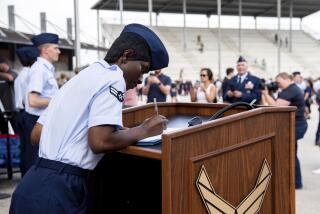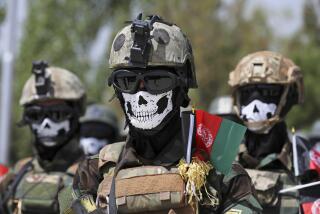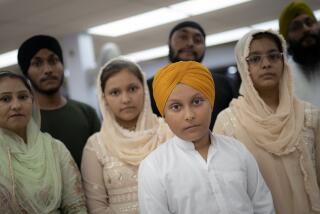Afghan Vote to Be a Test of Newly Trained Army
- Share via
PUL-I-CHARKI, Afghanistan — Three months ago, Pvt. Mangawar Khaksar lost his right leg to a grenade explosion while helping the Afghan army intervene in a battle between warlords.
On Saturday, he says, he’ll hobble to a polling center on his crutches if he has to in order to cast his vote in Afghanistan’s first presidential election. He enlisted to unify his shattered nation, and he believes the right to vote is fundamental to its future.
“I’ve sacrificed. Everyone has sacrificed -- and now it’s worth it because we can vote for our own freedom,” Khaksar, 22, said at an army training base here, his right pant leg flapping as he struggled to walk.
Afghan soldiers, and the Americans who train them, are at the center of Saturday’s elections. The Afghans will be peeling off from their army units to vote while providing security at the country’s 4,807 polling centers. U.S. military advisors will be helping the Afghans as part of a massive security presence.
After U.S. forces and Afghan militiamen drove the Taliban regime from power three years ago, efforts turned to rebuilding the country, creating an army and laying the foundation for a democracy. None of it is possible without security, and the American military is attempting to turn more responsibility over to the Afghan army and police.
Saturday will be a major test of how well the new, U.S.-trained army can perform in the face of threatened disruptions by the Taliban and Al Qaeda. The election itself is one measure of whether a nation with a history of civil war and authoritarian rule can adapt to democracy.
Even with the vote clouded by intimidation from warlords and tribal chiefs, Afghan soldiers say they will be there to ensure, at the very least, that voters are not molested at the polls.
“If anyone tries to bring pressure against any voters, our soldiers are under orders to stop it right away,” said Brig. Gen. Aminulla Patiayany, commander of a brigade sending troops to polling stations in central Afghanistan.
In a country divided by ethnic rivalries, the army is seen as a unifying force. American trainers tried to ensure that each unit reflected Afghanistan’s ethnic makeup, U.S. Army spokesman Capt. Benjamin Powell said.
Sgt. Wali Mohammed, 29, a Pushtun, said his army training had convinced him that the country could not move forward if people continued to define themselves by their tribe or ethnic group.
“I think every one of us in the army knows to vote for the best person, not just the one from their own ethnic group,” he said.
For American troops, the election is a reminder of their own democratic traditions. (Many of the thousands of U.S. service personnel here will vote by absentee ballot in the Nov. 2 U.S. election.)
Some soldiers say they have been intrigued by the high value Afghan soldiers and civilians place on a right many Americans either take for granted or don’t bother to exercise.
“They know it’s a privilege and they know this is a historic moment for their country,” said Lt. Col. David Enyeart, who commands a group of American trainers who will accompany Afghan units to polling centers. “The level of excitement is unbelievable.”
About 10.5 million people have registered to vote.
Virtually all of the 13,000 Afghan army soldiers trained so far will be assigned to election security duties, along with 2,000 who have not completed their training. Soldiers who have registered will be given time to vote.
The soldiers will back up about 48,000 police, who will be posted outside the country’s 21,521 voting stations -- more than 12,000 for men and the rest for women, in deference to Islamic custom. Each polling center has several voting stations.
For “close security” at voting centers, the faces voters see will be Afghan, said John McComber, international security director for the elections. In addition, he said, quick-reaction forces will be on call in case of a crisis.
The Afghan forces will be backed by 6,000 NATO soldiers and about 20,000 coalition forces, most of them Americans protected from the air by fighter planes and attack helicopters, U-2 spy planes and Predator remote-controlled aircraft.
First Sgt. David White, an American trainer from Palmerton, Pa., who has spent weeks talking to civilians in rural areas, said many requested that Afghan army units be posted in their villages to protect them from warlords and gunmen.
“They’re sick of all the fighting and they’re desperate for change,” he said. “They’ve never been allowed any freedom of expression.”
Another trainer, Capt. Casey Husar of Kittanning, Pa., said U.S. forces had tried to present themselves as agents of progress rather than as occupiers.
“I think most people realize our presence, and the presence of the [Afghan army], can only help people -- and Lord knows they need it,” Husar said.
With the Afghan army a long way from the U.S. goal of 70,000 trained troops, most of the nation’s security rests in American hands. But U.S. Ambassador Zalmay Khalilzad said this week that he expected U.S. trainers to reach the goal ahead of schedule.
“The sooner Afghans can take care of their own security, the better for them -- and for us,” he said. “The more they can do, the less we -- and I mean coalition forces -- will have to do.”
U.S. trainers say the Afghan army’s ethnic balance gives it credibility. Of the country’s estimated 27 million people, about 42% are Pushtun, 27% Tajik, 9% Hazara and 9% Uzbek, plus smaller ethnic groups.
Interim President Hamid Karzai, the leading figure among 18 candidates, is Pushtun. But many of the most powerful members of his transitional government are Tajiks who led the Northern Alliance militia, which helped U.S. and coalition forces topple the Taliban in late 2001.
On Saturday, Afghan soldiers will be expected to deal directly with any attacks or disruptions, especially in southern and eastern districts where support for the Taliban and Al Qaeda is strong. American trainers say they are eager to find out how well their charges respond under stress, even with the knowledge that they are backed by American military might.
Sgt. Maj. Mohammed Daud, 28, a Pushtun, said he would fight for his right to vote, as well as the voting rights of all Afghans. He said he intended to vote for the candidate who best presented an image of strength.
“Even if there are attacks and violence, the election will go forward,” Daud said. “The people look to us to be strong and give them confidence.”
Sgt. Aman Gul, 24, an army squad leader, said he fought against the Taliban for a local militia commander.
“Now I want to serve my country, not a militia,” he said. “And what better way to serve than to make sure people can vote in peace?”
More to Read
Sign up for Essential California
The most important California stories and recommendations in your inbox every morning.
You may occasionally receive promotional content from the Los Angeles Times.














